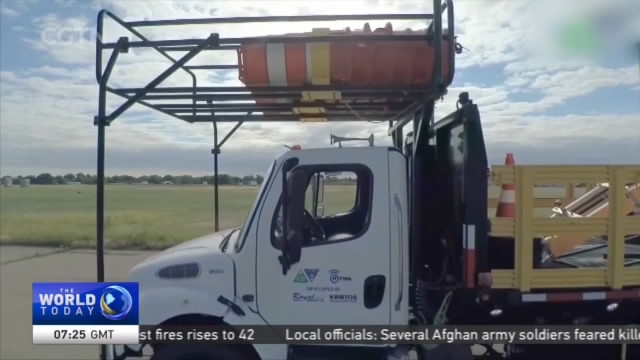
15:51, 19-Oct-2017
Driverless Future: Autonomous impact protection vehicles could save crash truck workers

Imagine climbing into a truck that's designed to be struck by a vehicle along the highway. That's the job of so-called crash truck drivers who provide a shield to crews doing road construction. Soon many of those work zone vehicles could be driverless. CGTN's Hendrik Sybrandy offers a preview from the U.S. state of Colorado.
Road work can be difficult and dangerous, often done in the blazing hot sun as cars go whizzing by.
SHAILEN BHATT EXECUTIVE DIRECTOR, COLORADO DEPT. OF TRANSPORTATION "It's pretty intense when those cars come by. In this era of what we call the D drivers, drunk, drugged, drowsy, distracted or dumb."
According to the Federal Highway Administration, there's a crash in a work zone every five minutes in the U.S. And on average more than two crash-related fatalities every day. Drivers of crash trucks, which offer protection to the mobile work crews just ahead of them, are particularly vulnerable.
SHAILEN BHATT EXECUTIVE DIRECTOR, COLORADO DEPT. OF TRANSPORTATION "It's like a crash test dummy or test pilot. It's a dangerous job."
Shailen Bhatt, the head of Colorado's Department of Transportation, is about to unseat at least one of those drivers. His agency will soon roll out what it claims is the world's first autonomous impact protection vehicle. A crash truck that relies on self-driving technology.
KYLE LESTER, HIGHWAY MAINTENANCE DIRECTOR COLORADO DEPT. OF TRANSPORTATION "It's actually a pretty simple set-up."
Director of Highway Maintenance Kyle Lester says the cushioned truck is positioned behind the lead vehicle. Then someone in the lead vehicle electronically controls it, using 10 G.P.S. points between the two trucks. Kyle Lester: "And in a sense you just press go and put the technology in operation."
KYLE LESTER, HIGHWAY MAINTENANCE DIRECTOR COLORADO DEPT. OF TRANSPORTATION "So wherever that lead vehicle goes, wherever that driver goes, this vehicle is following a certain distance behind."
HENDRIK SYBRANDY DENVER They've been testing this driverless truck, which is also just around the corner in the U.K., in places like parking lots. Most of the bugs, we're told, have been worked out.
Bhatt says the truck will be used conservatively to begin with, for road striping operations. He says his employees are on board with the idea.
SHAILEN BHATT EXECUTIVE DIRECTOR, COLORADO DEPT. OF TRANSPORTATION "A lot of people are concerned about automation and is it going to take jobs away from people. This is a job we want to take away from people."
The truck, which has attracted interest from dozens of other U.S. states, costs 350-thousand dollars, more than twice as much as a regular crash truck. Colorado hopes to buy more of these vehicles as the price comes down.
KYLE LESTER, HIGHWAY MAINTENANCE DIRECTOR COLORADO DEPT. OF TRANSPORTATION "As we perfect this, and fully deploy, people are going to see we can't afford not to do this."
SHAILEN BHATT EXECUTIVE DIRECTOR, COLORADO DEPT. OF TRANSPORTATION "It just makes sense on a lot of fronts."
It's a no-brainer, they say, when it comes to worker safety. Crash truck drivers pride themselves in taking one for the team, but that idea has always been better in principle than in practice. Hendrik Sybrandy, CGTN, Denver.

SITEMAP
Copyright © 2018 CGTN. Beijing ICP prepared NO.16065310-3
Copyright © 2018 CGTN. Beijing ICP prepared NO.16065310-3